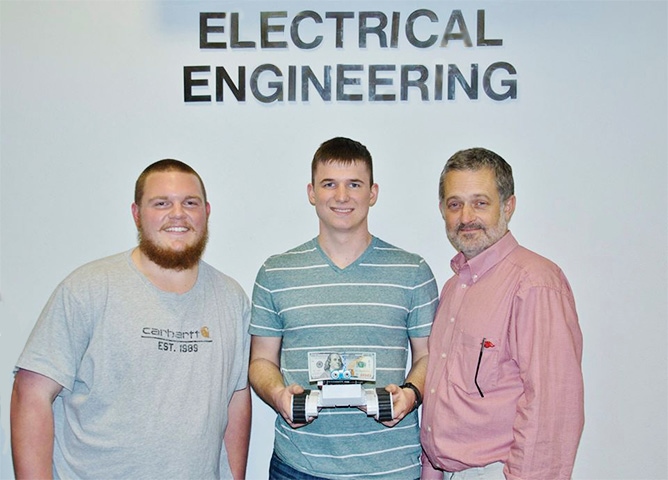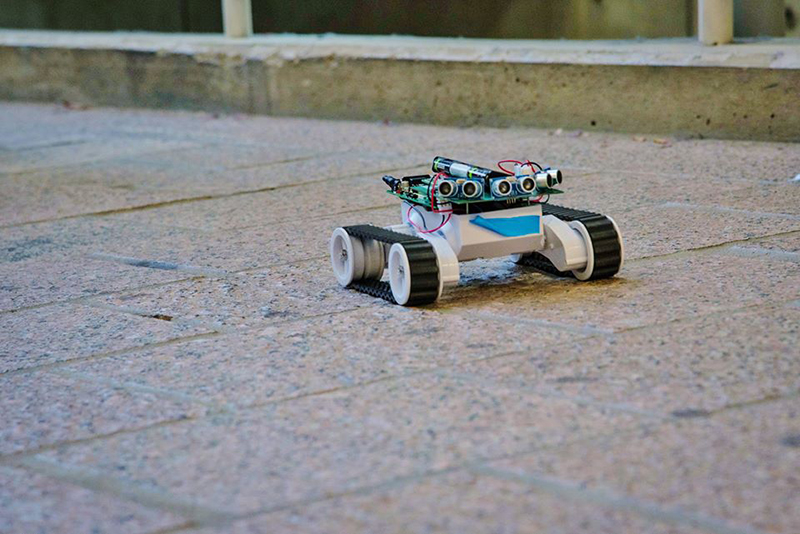Electrical Engineering Students Learn Practical Applications of Design Through Autonomous Car Competition

Autonomous Car Competition winners Sawyer Keller and Mason Torgerson, posing with course professor, Robert Saunders.
Fayetteville and Fort-Smith electrical engineering students came together last month to compete in the annual Autonomous Car Competition as part of their overall grade for Microprocessor Systems Design (ELEG 3924), an electrical engineering course taught by Robert Saunders, assistant department head and instructor.
ELEG 3924 is designed to introduce students to the inner working of microcontrollers. The autonomous car project serves as a cumulative test of the students' understanding of microprocessor system design, including assembly language, device interface, and microprocessor architecture.
At the end of fall, the ramp in Bell Engineering Center is scattered with obstacles bearing the "Engine Hog" logo, as onlookers watch autonomous cars make their way through the obstacle course. The goal is to avoid the targets and reach the finish line, an objective that carries the weight of one letter grade and potentially, the glory of a win.
Saunders's goal in creating the course was to provide his students with an opportunity to use class material in a system-based project.
"When I took over Microprocessor Systems Design," said Saunders, "I found the students learning the material for a test, but not understanding how to make use of the information." In order to create that opportunity, Saunders "came up with an innovative approach to motivate the students to go beyond the class."
 Autonomous Obstacle Avoidance Car programmed by electrical engineering students in the ELEG 3924 class. |
"I made the class center around a simple obstacle avoidance car," Saunders says. "All semester long, the students learn pieces to make the car work. They perform labs on each piece. Then, at the end of the semester, they have two weeks to turn the pieces into a system that works! This is what engineers do. We use the tools and information we have to build new and better systems."
For many students, this course serves as an introduction to the practical application of design. The course provides students with the opportunity to gain hands-on experience with design concepts, while the final competition provides a physical representation of design in the real world.
"The students find this to be very challenging," said Saunders, "but most find the accumulation of a semester's worth of material into one system that works, very rewarding."
The course "takes everything you've learned throughout the semester and puts it into one project," said Mason Torgerson, who along with teammate Sawyer Keller, won the latest autonomous car competition.
The students, who are both juniors in Electrical Engineering, took home the winning prize of $100 along with, said Sawyer, "a great, great basis to start off with" in the area of embedded systems.
"Mr. Saunders' class was the first electrical engineering class we've had where we really discussed practical applications and practical uses for microcontrollers," said Sawyer, who also notes that previous to ELEG 3924, he "had not had any exposure to embedded systems at all."
"Until Digital Design and Programming Foundations here, I had no experience with any digital electronics, no experience with any programming," continued Sawyer.
Mason on the other hand, is a self-learner whose previous experience with embedded systems comes from "a lot of learning at home" and "just a passion for electronics."
"It's the reason why I'm here in the first place", he says. "I would just spend a lot of time at home with breadboards, playing with microcontrollers that I've got; watching YouTube videos."
When asked what they gained from the course, both students speak of teamwork.
"We'd come in and bounce ideas off of each other and argue a little bit. Then, we would determine which idea we liked the best and make some modifications," said Sawyer.
"I would compromise," said Mason. "I had this idea that I was going to work on but Sawyer might have a decent idea. This was the first time I had a partner who is on the same page and really had the same drive to get this done and excel." Furthermore, he added, "I have learned to communicate better with a teammate."
 Erica Logal was one of the first Micro-P competition winners. |
Erica Logal is a U of A alumna who currently works for Northrop Grumman. Erica was one of the very first Micro-P competition winners.
"This was the first major project I completed as an undergrad," Erica remembers. "Saunders didn't give us much direction besides the tools and the final goal. Most projects in a professional setting are the same way. You are the engineer and it's your job to find a solution".
"College was the first time I began developing the skill of using creative methods to accomplish a unique goal," stated Erica. For the Micro-P competition, "we had the tools but not the answer. This problem solving is the exact creativity and innovation needed for an engineer".
Erica is currently in the Professional Development Program at Northrop Grumman, working in the System Integration and Testing program. The products Northrop Grumman offers are very innovative. "They expect you to become more innovative as you progress in your career," she noted.
Of her college career, Erica values the analytical thinkig skills she developed the most. "Looking at every scenario and every option is key for a successful engineer."
Topics
Contacts
Robert Saunders, assistant department head
Department of Electrical Engineering
479-575-6047,
rsaunder@uark.edu
Headlines
U of A Bands to Hold Three Nights of Concerts
The Symphonic Band, the Wind Symphony, the 4 O'Clock and 5 O'Clock Bands and the Wind Ensemble will perform April 21-23 at the Faulkner Performing Arts Center on the U of A campus.
Honors College to Host 'Best in Show' Dog Celebration
The campus and community are invited to celebrate our furry friends with popsicles, water and dog treats from 3-4 p.m. Thursday, April 25, in the Gearhart Courtyard.
New Parasite Affecting Canadian Partridges Named for Arkansas Poultry Scientist
A long-time colleague in Canada gave a newly found parasite the scientific name Eimeria hargisi in honor of U of A poultry science researcher Billy Hargis.
U of A School of Law Student Selected for Ms. J.D. Leadership Academy Intensive
Tristan Branstetter-Thomas, a second-year law student, was one of 30 students from across the country chosen to participate in the leadership academy at the Northwestern Pritzker School of Law in Chicago.
Needy Honored as Distinguished Alumna of University of Pittsburgh Engineering College
College of Engineering Dean Kim Needy was among seven alumni of the University of Pittsburgh Swanson School of Engineering honored in April as part of the 2024 Class of Distinguished Alumni.




